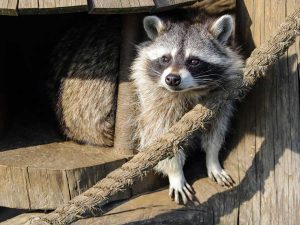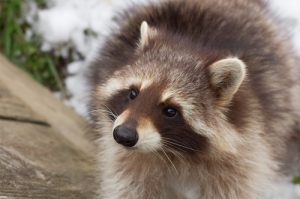
Florida has a milder climate than most other areas of the country, with hot summers and relatively warm winters. This makes encountering a hibernating animal a rarity in the Central Florida area. While there are many species of critters that hibernate all over the world, the raccoon is not one of them. However, their adaptable nature allows them to thrive during colder months by changing their diets and seeking shelter.
Instinctive Behaviors of Raccoons
Here are a few behaviors that raccoons adopt during the winter to increase their ability to survive.
-
Wintertime dieting

Raccoons are natural omnivores, which comes in handy to them when food sources become scarcer in the winter. For most of the year their diet consists primarily of plants, eggs, insects, and garbage thrown out by humans; but during the winter they will eat acorns, fruits, and even small or crippled animals if available.
-
Increasing fat reserves
Much like how hibernating animals increase their food intake to build their fat reserves before going to sleep for the winter, raccoons plump themselves up in the months leading up to winter. Instead of being their sole source of nourishment, these fat stores supplement the raccoon’s diet and make it easier to survive if no food is available for an extended period.
-
Taking shelter
Shelter is important for all living creatures when winter arrives, and raccoons are no exception. They will build dens or seek shelter in hollowed out trees or buildings if the opportunity is presented to them.
-
Torpor
Similar to hibernation in some ways, torpor is an energy-conserving state that raccoons enter during the winter. They can sleep in a curled up position in their den for weeks at a time which reduces the amount of food and energy needed to survive. When torpor occurs, the raccoon’s body temperature and blood sugar drop significantly to further reduce their body’s nutritional needs. During torpor, raccoons can sometimes wake up on warmer days to forage for food before returning to their den. This periodic awakening allows them to stay more alert for predators.
The Danger of Invasive Raccoons
If you come across a raccoon on your Orlando property at any time of the year, keep a safe distance and do not try and capture or remove the wild animal on your own. Raccoons are unpredictable critters that can attack, bite, and scratch if provoked or threatened. They are also known to carry contagious diseases like rabies that can easily spread to humans and pets.
Rely on Professional Raccoon Removal Services in Orlando
When you notice raccoons in your home or on your Central Florida property, be sure to contact the team of professional raccoon removal specialists at Critter Control® of Orlando. Call us today at 407-295-7194 to schedule an inspection and receive a free raccoon removal estimate.





